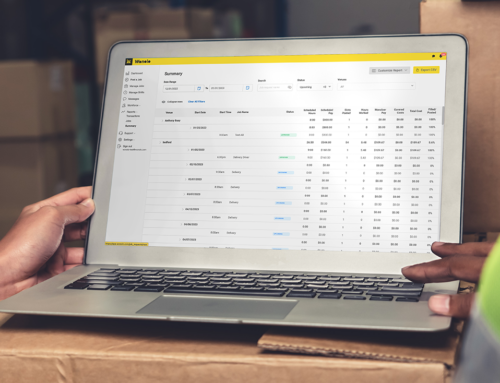Yong Kim
Let’s meet Monica
Monica joined Wonolo earlier this year as the Vice President of Supply, leading teams focused on strategy, operations and programs related to the Wonoloer community. Prior to Wonolo, Monica spent 10 years at Google in leadership roles across Sales and Operations.

What are you grateful for today?
How long do you have? If I had to pick a theme for the last year it might be gratitude. I’ve been running a mile a minute — in a very straight line — for most of my life, always aiming for the “right” or “most logical” next step. Last year, I had a bit of an awakening that led me to take a look at where I had been spending my time and energy, realizing pretty quickly that I needed a change. So after more than a decade at Google, I left to take a few months to focus on my family and myself, and it was exactly what I needed to wrap my head around what I really wanted for the next phase of my career.
I am grateful for that time and for Wonolo for being the exact thing I didn’t know I was looking for. I’m also grateful for my husband who never questioned my decision, for my two sons who keep me grounded, and for my amazing support network that always helps me keep perspective.
When you were in high school, what did you dream of becoming?
I’m not really the dreamer type so in a true sense, I’m not sure I ever really had a grand vision for the future other than a general desire to have a successful career and a happy, healthy family. I was the first in my family to go to college, so the opportunity to do so already felt like a dream realized. That said, there is one life ambition that has been floating around since high school and continues through today, which is to someday write a book. My personal archives have a few false-start chapters here and there, none of which will ever see the light of day, but the idea of creating something lasting (… be it fiction, non-fiction, children’s literature or even a podcast) is always in the back of my mind.
What events in your life have led you to your current role/job today?
Every role I’ve had leading up to today has been a breadcrumb on the path to Wonolo.
Straight out of undergrad, I worked in marketing during the early days of online advertising (think Alta Vista and AskJeeves) and that role helped me realize that I loved the intersection of tech and business, and that I wanted to build a stronger toolkit in both. That led me to UCLA Anderson, where I discovered I was interested in many aspects of business — from operations to economics to strategy to organizational development — and realized that I wouldn’t likely be happy in a role that was hyper-specialized.
When Google came knocking with a “general management” opportunity, I knew it was the right place to start my post MBA career. In my first role, within the Online Sales and Operations organization, I was able to wear many hats, gained a deep love for people management, and was exposed to amazing female role models such as Sheryl Sandberg and Claire Hughes-Johnson. From there, I joined my first “internal startup”, where I was able to help build a product from an idea on paper to a category-creating disruptive technology, growing and nurturing a high-performing team along the way. My final role at Google found me running operations within a gig-economy business, which felt like the perfect category for me as success depended not only on numbers and metrics, but on understanding people and their personal motivations.
At that point, I felt confident I knew what I needed in a role to feel challenged and successful, but I also realized that I was missing a fundamental piece of the puzzle, which was to contribute to society in a more direct way. My short career-break was aimed at putting that puzzle together — researching and reflecting on whether any role or company could truly “have it all”. I had started to think it wasn’t possible until I found Wonolo.
Wonolo provided everything I was looking for — a mission-driven culture, inspiring leadership, a disruptive model and an opportunity to have a real impact on the direction and success of the business. It wasn’t the obvious choice given I was coming from a big company with an even bigger brand, but it was the absolute right one.

When things do not turn out the way you planned, what is the first thing you do?
First, I take a deep breath and remind myself that things rarely go exactly as planned. Then I get to work pulling out whatever lessons are embedded in the situation — I have yet to experience a failure or misstep that didn’t result in some level of learning or personal growth. Finally, I move on. Dwelling gets you nowhere. Blaming moves you backward.
When you have to make a difficult decision, what do you lean on?
I’m not naturally great at making big or difficult decisions. I have a tendency to over analyze and my neuroses take over as I worry about what the “right” decision is and what the fallout could be if I make the “wrong” decision (even when I know full well most decisions are far from binary). So, when faced with these types of decisions, I often rely on a piece of advice I received in my first two weeks at Google.
I was brand new to people management, and I was asked to manage an employee who had been put on a performance improvement plan. The decision to keep or let go of him would be mine in a month’s time, and I was beside myself with stress and worry. It was then that a mentor gave me the advice that sticks with me today, which was to rely on the “sleep at night” test. She said that when making a tough decision, particularly one that is risky or may negatively impact others, ask yourself if you have done everything in your power to understand the situation and weigh the options and impact the likelihood of success given the timeline or context. In other words, can you sleep well at night knowing you’ve done everything you can? In that particular situation, I devoted myself to giving the individual every tool and opportunity possible to make an improvement, show impact, and share his point of view. In the end, the tough decision to let go of the individual had to be made, and while it was hard and I wished for a different outcome, I was certain I had done what I could to impact the outcome and was confident in the decision. I have carried that experience, and that advice, with me ever since.
What is one life advice you can give to anyone?
My advice would be to maintain perspective. It sounds so simple but when the going gets tough — in work, life, relationships, families, whatever — perspective is often the first thing to go. I fall into that trap often, but my husband is terrific at maintaining perspective and I try to learn from him. He always takes the time to be grateful for life’s peaks, doesn’t let himself get weighed down in the valleys, and is typically optimistic for the road ahead.
Personally, I apply this advice at work by reminding myself and my teams that in business — like in life — there are ups and downs, missteps and miscommunications happen, and failures are as inevitable as successes. Things are never as terrible or insurmountable as they seem, and you’d be hard pressed to find a challenge or struggle that is unique and hasn’t been faced by other businesses (or even your own) many times before. You’ll get through it, find a smoother road, and then hit bumps all over again. Win, lose, struggle, succeed, rinse, repeat. If you can keep your wits about you, enjoy the journey and be your authentic self throughout, you’ll be just fine.

Please finish this sentence: If you really knew me, you would know that ______.
I have a not-so-secret obsession with musicals (I have seen Hamilton four times), I have a very good memory (often for completely pointless things), I am a San Francisco native and I hate cilantro.






